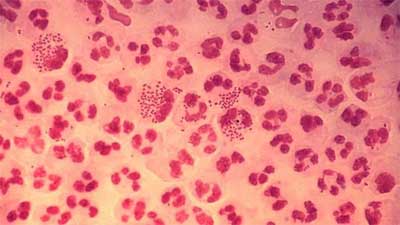- Home
- Editorial
- News
- Practice Guidelines
- Anesthesiology Guidelines
- Cancer Guidelines
- Cardiac Sciences Guidelines
- Critical Care Guidelines
- Dentistry Guidelines
- Dermatology Guidelines
- Diabetes and Endo Guidelines
- Diagnostics Guidelines
- ENT Guidelines
- Featured Practice Guidelines
- Gastroenterology Guidelines
- Geriatrics Guidelines
- Medicine Guidelines
- Nephrology Guidelines
- Neurosciences Guidelines
- Obs and Gynae Guidelines
- Ophthalmology Guidelines
- Orthopaedics Guidelines
- Paediatrics Guidelines
- Psychiatry Guidelines
- Pulmonology Guidelines
- Radiology Guidelines
- Surgery Guidelines
- Urology Guidelines
Test to identify best treatment for gonorrhea now developed

Researchers from UCLA have developed a laboratory test that helps physicians determine which people with gonorrhea may be more treatable with an antibiotic that has not been recommended since 2007 because of concerns that the resistance to the drug was growing.
Background
Gonorrhea has developed increasing resistance to all current antibiotics. Due to the spread of multi-drug resistant gonorrhea, health authorities have declared it one of the top-three urgent threats to public health.
Ciprofloxacin was used to combat the sexually transmitted infection until 2007, when the Centers for Disease Control and Prevention stopped recommending its use after gonococcal infections developed resistance to it. Nevertheless, about 80 percent of gonorrhea infections in the United States, however, could be treated with ciprofloxacin. Scientists have been trying to determine how to better identify cases for targeted use of ciprofloxacin therapy, reducing the need to use the antibiotic ceftriaxone and risking increased resistance to that drug. Gonorrhea's resistance rate to ceftriaxone is currently less than 1 percent.
Method
The research was conducted at UCLA Health's hospitals, emergency departments and primary care clinics. After developing a test to detect a genetic change in gonorrhea that makes it resistant to ciprofloxacin, the researchers noted what treatments UCLA physicians had been using to treat gonorrhea. They then used the new test for all gonorrhea cases over a nine-month period and compared treatments before and after test introduction.
Based on the results from the new DNA test, physicians appropriately changed treatment choices decreasing the use of ceftriaxone from 100 percent of the time to 60 percent. Correspondingly, the use of ciprofloxacin increased from 0 percent to 40 percent of cases.
Impact
These findings are important because there are a limited number of medications to treat gonorrhea. Reusing previously effective antibiotics and decreasing the use of ceftriaxone may slow down the continued emergence of antibiotic resistance.
For more details click on the link : Lao-Tzu Allan-Blitz, Romney M. Humphries, Peera Hemarajata, Ashima Bhatti, Mark W. Pandori, Mark J. Siedner, Jeffrey D. Klausner. Implementation of a Rapid Genotypic Assay to Promote Targeted Ciprofloxacin Therapy of Neisseria gonorrhoeae in a Large Health System. Clinical Infectious Diseases, 2016; ciw864 DOI: 10.1093/cid/ciw864

Disclaimer: This site is primarily intended for healthcare professionals. Any content/information on this website does not replace the advice of medical and/or health professionals and should not be construed as medical/diagnostic advice/endorsement or prescription. Use of this site is subject to our terms of use, privacy policy, advertisement policy. © 2020 Minerva Medical Treatment Pvt Ltd